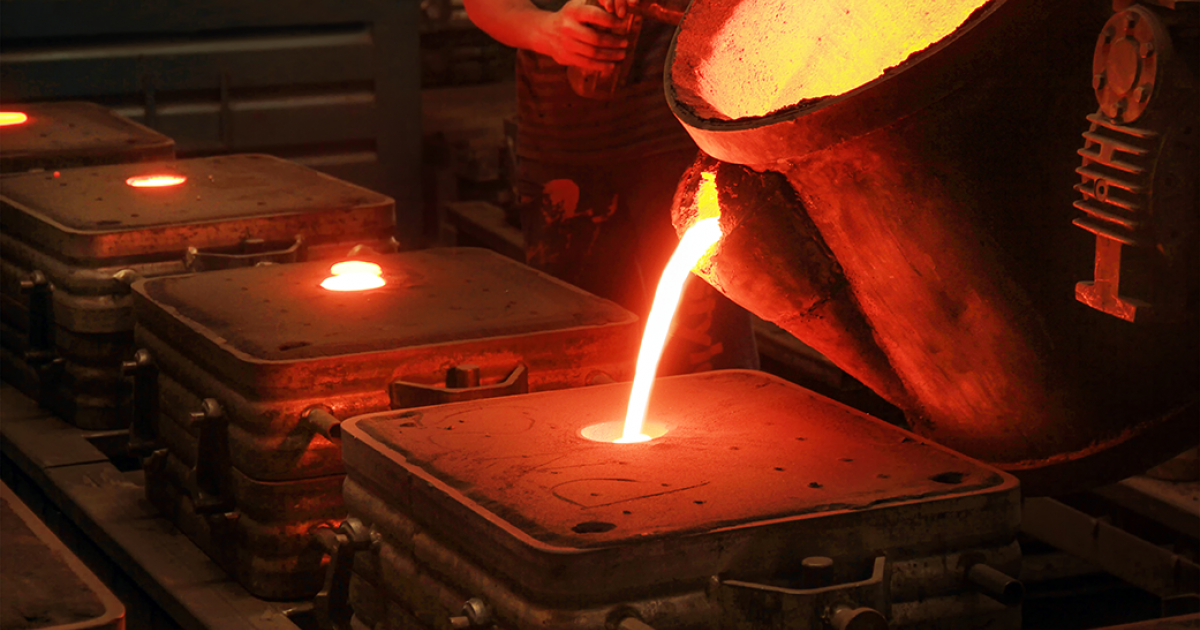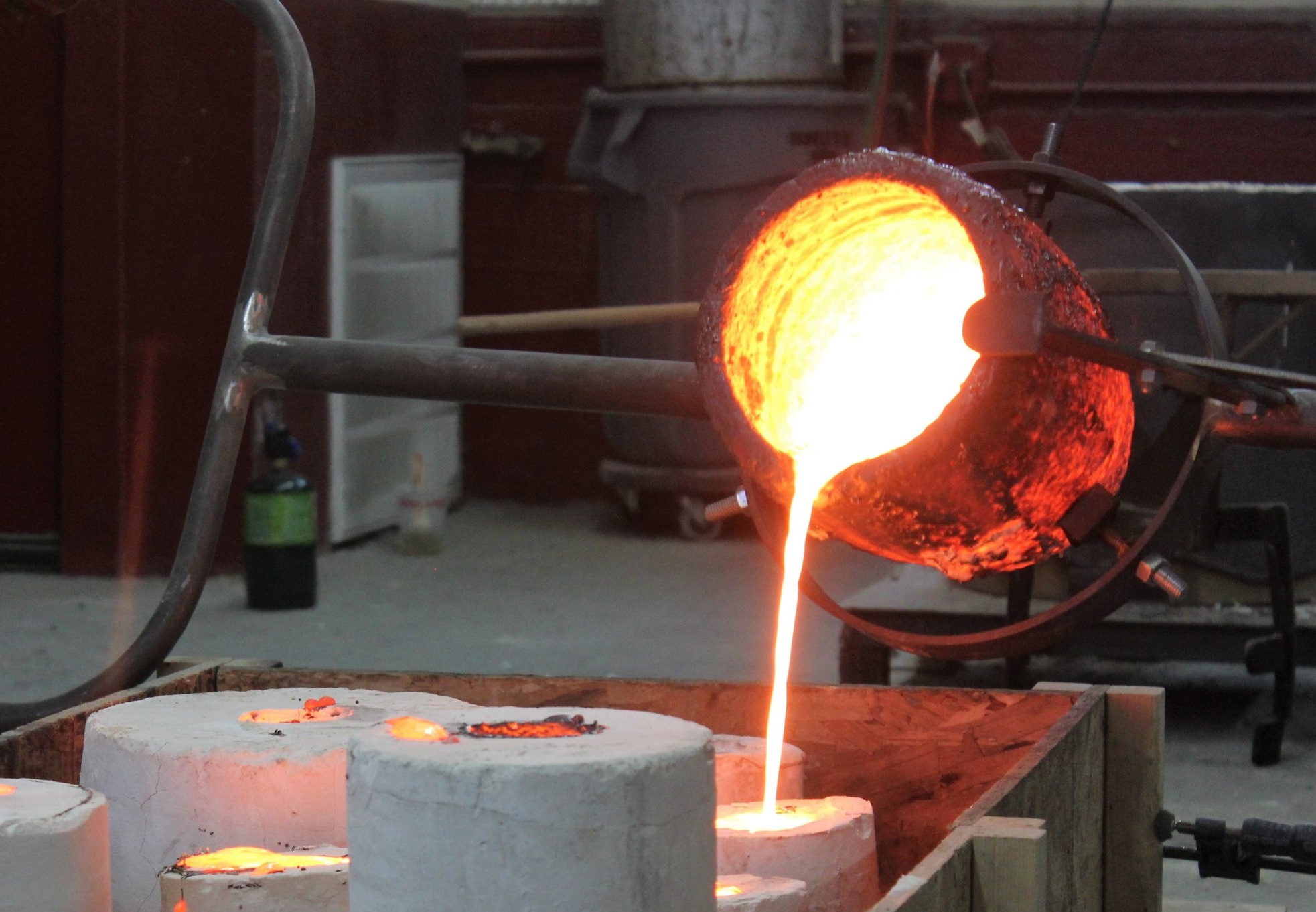What Artists Can Learn from the Artistic Side of Metal Casting
Wiki Article
A Comprehensive Overview to Metal Casting: Benefits and Providers Provided by Foundries
Metal casting is a crucial procedure in different markets, offering various benefits through the solutions of shops. These facilities change liquified metal right into resilient and specific components, accommodating certain client requirements. By employing advanced innovations, foundries ensure quality and efficiency in manufacturing. The ins and outs of metal casting and the varied methods included increase essential inquiries concerning its role in contemporary manufacturing. What technologies lie ahead in this important area?Comprehending the Metal Casting Process
The metal casting process is a basic technique used in making to produce complicated shapes and components. This approach includes putting liquified metal right into a mold created to develop the preferred item. The procedure starts with pattern development, which serves as a layout for the mold. Aluminum Casting. Different materials, such as sand, metal, or ceramic, are utilized for mold-making, depending on the certain demands of the casting
Once the mold and mildew is ready, molten metal is put right into it and permitted to cool and strengthen. After solidification, the mold is gotten rid of, revealing the actors component. Numerous techniques, consisting of sand casting, investment casting, and pass away casting, are used, each suited to different applications and products. Quality control measures, such as examinations and testing, are vital to guarantee the end product meets specs. Generally, the metal casting procedure plays an important duty in generating parts for sectors varying from auto to aerospace.
Secret Conveniences of Metal Casting
Metal casting supplies significant benefits that make it a preferred manufacturing method in different industries. Its layout flexibility and precision enable complex forms, while cost-effective mass production boosts performance. In addition, the convenience and strength of products made use of in casting add to the sturdiness of the final products.Layout Flexibility and Accuracy
Launching amazing layout flexibility and precision, metal casting permits engineers and designers to create elaborate forms and features that would be impossible or challenging to accomplish with various other manufacturing techniques. This capacity enables the production of complicated geometries, inner frameworks, and great details that enhance product capability and visual appeals. Furthermore, numerous casting strategies, such as sand casting, financial investment casting, and die casting, provide further options for modification, suiting varied product residential properties and task needs. The flexibility of mold and mildews allows alterations throughout the layout stage, simplifying the change from principle to end product. Inevitably, metal casting stands out for its ability to supply high-precision parts, making it an indispensable procedure in markets ranging from vehicle to aerospace and beyond.Affordable Mass Production
Cost-effective automation stands as one of the key benefits of metal casting, allowing producers to produce large amounts of parts at a reduced price per device. This effectiveness occurs from the ability to create intricate mold and mildews that can be recycled several times, significantly decreasing setup and functional expenses. Additionally, metal casting processes, such as sand casting and pass away casting, enable for high throughput, making it possible to meet the demands of massive manufacturing runs. The reduced product waste and power usage even more enhance price savings, making metal casting an eye-catching choice for markets requiring mass elements. Overall, the cost-effective nature of metal casting placements it as a favored method for suppliers going for financial effectiveness in their production procedures.Material Versatility and Stamina
Among the standout qualities of metal casting is its impressive product versatility, which enables for making use of a vast array of metals and alloys. This adaptability makes it possible for manufacturers to choose products that best suit their certain applications, from aluminum and bronze to iron and steel. Each metal supplies one-of-a-kind buildings, consisting of varying levels of stamina, deterioration resistance, and thermal conductivity. As a result, metal casting can generate elements that meet rigorous efficiency needs throughout diverse sectors, such as automotive, aerospace, and building. Furthermore, the toughness of cast steels can be enhanced through various treatment processes, guaranteeing durability and longevity. Metal Foundry. Overall, the combination of material versatility and inherent strength makes metal casting a preferred option for producing top quality elementsSorts Of Metal Casting Techniques
Metal casting encompasses a variety of techniques that deal with various production demands and product buildings. Typical techniques include sand casting, which utilizes a sand mold and mildew for intricate shapes, and investment casting, known for its precision and surface coating. Pass away casting is an additional strategy that uses high-pressure injection of molten metal right into mold and mildews, ideal for automation of little components.Covering molding supplies a much faster different, using a resin-coated sand to develop thin-walled mold and mildews, while lost foam casting enables detailed designs without the need for a core.
In addition, constant casting is used for generating lengthy sections of metal, such as sheets or bars, by strengthening molten metal in a continuous process. Each method is and offers one-of-a-kind advantages selected based upon aspects like the required detail, manufacturing quantity, and product kind, making sure remarkable end results in metal fabrication across various sectors.
The Role of Foundries in Metal Casting
Foundries play an essential function in the metal casting process, functioning as the centers where liquified metal is transformed right into completed items. These specialized establishments are equipped with the essential tools and technologies to manage different steels, making certain high-grade click to investigate end results. Factories are in charge of a number of important features, including thawing the metal, pouring it into molds, and enabling it to solidify.Furthermore, they preserve rigorous safety and environmental criteria to protect workers and reduce eco-friendly influence. Proficient technicians and engineers work together to enhance casting procedures, boosting performance and reducing waste. Foundries likewise participate in quality assurance procedures, ensuring that the final items fulfill specific tolerances and specifications. This quality assurance is important for industries that rely upon accurate components, such as automobile and aerospace. Consequently, foundries contribute substantially to the total production landscape, making it possible for technology and development throughout different industries.
Customized Metal Casting Services
Custom-made metal casting solutions use customized style options that satisfy certain customer needs. These solutions likewise provide material option proficiency, ensuring the right metal is picked for the wanted application. Such versatility and knowledge enhance the total high quality and performance of the final product.
Tailored Style Solutions
Customized design services in metal casting give manufacturers with the versatility to develop components that meet certain performance and aesthetic needs. Foundries use tailored services that enable customers to specify measurements, forms, and surface finishes to attain desired results. This modification process typically consists of cooperation in between engineers and designers, making certain that the end products align with functional needs and sector standards. Advanced innovations, such as computer-aided style (CAD) and simulation software, allow exact modeling and screening of components before production, lessening mistakes and boosting effectiveness. By leveraging tailored style options, services can enhance performance while minimizing waste and expenses, eventually resulting in a much more one-upmanship on the market. This versatility is crucial for industries calling for special applications and specifications.Material Selection Experience
When choosing products for metal casting, competence plays an important function in guaranteeing that the best choice straightens with both efficiency requirements and cost-effectiveness. Shops employ competent specialists that understand the homes of various steels and alloys, allowing them to advise optimal materials for certain applications. Factors such as toughness, corrosion resistance, and thermal conductivity are meticulously thought about to meet the customer's requirements. Additionally, sector patterns and developments in material scientific research inform these choices, enabling factories to remain competitive. By leveraging their expertise, factories can aid clients in steering via complex material alternatives, ultimately causing boosted product high quality and reduced production expenses. This customized knowledge is crucial for attaining successful results in personalized metal casting solutions.Quality Assurance in Metal Casting
Quality assurance in metal casting is crucial to ensure that the end products meet the required specs and efficiency criteria. Foundries utilize a selection of techniques and approaches to guarantee the finest of cast parts. This process begins with rigid material inspections, confirming that raw materials abide by sector criteria. Throughout the casting procedure, real-time monitoring and testing are conducted to analyze criteria such as temperature, mold honesty, and dimensional accuracy.
Applications of Metal Castings Across Industries
Metal spreadings play an essential function in numerous markets, acting as the foundation for numerous applications. In the vehicle field, cast components such as engine blocks and transmission real estates are necessary for car efficiency and integrity. The aerospace industry counts on accuracy spreadings for essential elements that ensure security and performance in trip. Furthermore, the building and construction market utilizes metal spreadings for components, installations, and architectural components, boosting the longevity of buildings and infrastructure.The power market advantages from spreadings used in turbine blades and other devices crucial for power generation. The clinical area likewise utilizes metal castings in tools and gadgets, demonstrating the versatility of this production procedure. On the whole, metal spreadings are important to the performance and development of diverse fields, showcasing their relevance in contemporary technology and infrastructure development
Regularly Asked Inquiries
What Materials Are Typically Utilized in Metal Casting?
Typical materials used in metal casting consist of light weight aluminum, iron, brass, steel, and bronze. Each material uses distinct homes suitable for different applications, permitting makers to select the ideal choice based on rust, weight, and stamina resistance.How Long Does the Metal Casting Process Usually Take?
i loved thisThe metal casting procedure typically takes several hours to a couple of days, relying on variables such as the intricacy of the style, kind of metal used, and the particular casting technique utilized by the factory.
What Is the Ecological Effect of Metal Casting?
The ecological impact of metal casting consists of energy usage, exhausts, and waste generation. Foundries usually execute procedures to minimize these effects, such as reusing products and utilizing cleaner innovations to lower their ecological footprint.Can Metal Casting Be Done for Small-Scale Projects?
Metal casting can undoubtedly be executed for small projects. Various foundries satisfy such demands, providing personalized options that suit minimal manufacturing runs more while maintaining high quality and accuracy in the end products.What Are the Precaution in Metal Casting Foundries?
In metal casting shops, precaution include individual safety equipment, appropriate air flow, training on equipment use, emergency situation treatments, regular upkeep checks, and adherence to sector safety requirements to lessen risks related to liquified metal and hazardous materials.Furthermore, metal casting procedures, such as sand casting and pass away casting, allow for high throughput, making it viable to fulfill the needs of massive production runs. One of the standout qualities of metal casting is its amazing material versatility, which allows for the usage of a large variety of alloys and steels. In addition, constant casting is utilized for producing lengthy sections of metal, such as bars or sheets, by strengthening molten metal in a continuous process. Shops play a crucial function in the metal casting process, offering as the facilities where liquified metal is changed into completed products. Usual materials utilized in metal casting include aluminum, iron, brass, steel, and bronze.
Report this wiki page